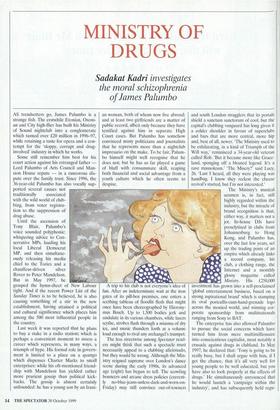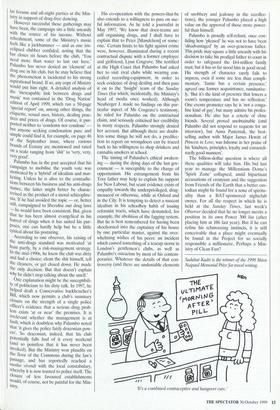MINISTRY OF DRUGS
Sadakat Kadri investigates the moral schizophrenia of James Palumbo
AS trendsetters go, James Palumbo is a strange fish. The erstwhile Etonian, Oxoni- an and City high-flier has built his Ministry of Sound nightclub into a conglomerate which turned over £20 million in 1996-97, while retaining a taste for opera and a con- tempt for the 'sloppy, corrupt and drug- involved' industry in which he works.
Some still remember him best for his court action against his estranged father Lord Palumbo of Arts Council and Man- sion House repute — in a rancorous dis- pute over the family trust. Since 1996, the 36-year-old Palumbo has also vocally sup- ported several causes not traditionally associated with the wild world of club- bing, from voter registra- tion to the suppression of drug abuse.
Until the ascension of Tony Blair, Palumbo's voice sounded polyphonic: whispering advice to Con- servative MPs, lauding his local Liberal Democrat MP, and then simultane- ously releasing his media chief to the Tories and a
chauffeur-driven silver Rover to Peter Mandelson. But in May 1997, he grasped the hymn-sheet of New Labour tight. And if the recent Power List of the Sunday Times is to be believed, he is also causing something of a stir in the new establishment, having attained a political and cultural significance which places him among the 500 most influential people in the country.
Last week it was reported that he plans to buy a stake in a radio station; which is perhaps a convenient moment to assess a career which represents, in many ways, a triumph of hype. His formal role in govern- ment is limited to a place on a quango which dispenses Charter Marks to small enterprises: while his oft-mentioned friend- ship with Mandelson has yielded rather more prurient gossip than political kick- backs. The gossip is almost certainly unfounded: he has a young son by an Irani-
an woman, both of whom now live abroad; and at least two girlfriends are a matter of public record, albeit only because they have testified against him in separate High Court cases. But Palumbo has somehow convinced many politicians and journalists that he represents more than a nightclub impresario on the make. To be fair, Palum- bo himself might well recognise that he does not; but he has so far played a game of bluff with consummate skill, reaping both financial and social advantage from a youth culture which he often seems to despise.
A trip to his club is not everyone's idea of fun. After an indeterminate wait at the iron gates of its pill-box premises, one enters a seething tableau of floodlit flesh that might once have been choreographed by Hierony- mus Bosch. Up to 1,500 bodies jerk and undulate in its various chambers, while lasers scythe, strobes flash through a miasma of dry ice, and music thunders forth at a volume loud enough to rival any archangel's trumpet.
The less streetwise among Spectator read- ers might think that such a spectacle must necessarily appeal to a clubbing aficionado, but they would be wrong. Although the Min- istry reigned supreme over London's dance scene during the early 1990s, its advanced age (eight) has begun to tell. The scowling bouncers and arcane dress policies (current- ly no-blue-jeans-unless-dark-and-worn-on- Friday) may still convince out-of-towners and south London stragglers that its portals shield a sanctum sanctorum of cool, but the capital's clubbing vanguard has long given it a colder shoulder in favour of superclubs and bars that are more central, more hip and, best of all, newer. `The Ministry used to be exhilarating, in a kind of Triumph of the Will way,' reminisced a 34-year-old veteran called Rob. `But it became more like Grace- land, sponging off a bloated legend. It's a rave mausoleum.' The Misery?' said Lucy, 26. 'Last I heard, all they were playing was handbag. I know they reckon the cheese revival's started, but I'm not interested.'
The enterprise has also allowed Palumbo to pursue the social concerns which have turned him from mere multimillionaire into conscientious capitalist, most notably a crusade against drugs in clubland. In May 1997, he declared that: 'Tony is going to be really busy, but I shall argue with him, if I get the chance, that it's all very well for young people to be well educated, but you have also to look properly at the effects of drugs.' He simultaneously announced that he would launch a 'campaign within the industry', and has subsequently held regu-
lar forums and all-night parties at the Min- istry in support of drug-free dancing. However successful those gatherings may have been, the campaign sits a little uneasily with the source of his income. Without refreshment, some of the Ministry's music feels like a jackhammer — and as one iris-
eclipsed dubber confided, noting that the bar closes six hours before the club, 'You need more than water to last out here.' Palumbo has never denied an 'element' of drug use in his club, but he may believe that the phenomenon is incidental to his strong aspirational brand. If so, any copy of Ministry would put him right. A detailed analysis of the 'inescapable link between drugs and music' was contained in the 'Drug Nation' edition of April 1999, which ran a 50-page 'special report' on, among other things, the etiquette, sexual uses, history, dealing prac- tices and prices of drugs. Of course, it pur- ported neither to 'condemn nor condone' but anyone seeking condonation pure and simple could find it, for example, on page 46 of the September issue, where various brands of Ecstasy are mentioned and rated on a scale ranging from 'shit' to 'very, very, Very good'.
Palumbo has in the past accepted that his campaign to mobilise the youth vote was motivated by a 'hybrid' of idealism and mar- keting. Unless he is alive to the contradic- tions between his business and his anti-drugs stance, the latter might better be charac- terised as the product of a moral schizophre- nia. If he had avoided the topic — or, better still, campaigned to liberalise our drug laws — he would have been consistent. But, given that he has been almost evangelical in his hatred of drugs when it has suited his pur- Poses, one can hardly help but be a little cynical about his posturing.
According to one observer, his raising of the anti-drugs standard was motivated 'at least partly, by a risk-management strategy. In the mid-1990s, he knew the club was dirty and had a choice: clean the shit himself, tell the cleaners, or get closed down. He made the only decision. But that doesn't explain Why he didn't stop talking about the smell.' One explanation might be the susceptibili- ty of politicians to his dirty talk. In 1997, he helped draft a Conservative backbencher's Bill, which now permits a club's summary closure on the strength of a single police officer's evidence that a serious drug prob- lem exists 'at or near' the premises. It is Irrelevant whether the management is at fault, which is doubtless why Palumbo noted that 'it gives the police fairly draconian pow- ers'. So draconian, indeed, that his club potentially falls foul of it every weekend (and so pointless that it has never been invoked). But the Ministry won plaudits on the floor of the Commons during the law's Passage, and has reportedly reached a modus vivendi with the local constabulary, whereby it is now trusted to police itself. The closure of less favoured establishments would, of course, not be painful for the Min- His co-operation with the powers-that-be also extends to a willingness to pass on use- ful information. As he told a journalist in May 1997, 'We know that door-teams are still organising drugs, and 1 shall have to explain that to Peter [Mandelson] or some- one.' Certain limits to his fight against crime were, however, illuminated during a recent contractual dispute with a former employee and girlfriend, Lynn Cosgrave. She testified at the High Court that Palumbo had asked her to visit rival clubs while wearing con- cealed recording-equipment, in order to seek evidence of drug dealing and then pass it on to the 'Insight' team of the Sunday Times (for which, incidentally, the Ministry's head of media once worked). Although Neuberger J. made no findings on this par- ticular aspect of Ms Cosgrave's testimony, he ruled for Palumbo on the contractual claim, and seriously criticised her credibility in many respects. Palumbo strongly denied her account. But although there are doubt- less some things he will not do, a predilec- tion to report on wrongdoers can be traced back to his willingness to shop drinkers and cannabis smokers at school.
The timing of Palumbo's ethical awaken- ing — during the dying days of the last gov- ernment — is susceptible to the charge of opportunism. His estrangement from his Tory father may help to explain his support for New Labour, but scant evidence exists of empathy towards the underprivileged, drug- menaced or otherwise, while at Oxford and in the City. It is tempting to detect a nascent idealism in his schoolboy habit of issuing reformist tracts, which have demanded, for example, the abolition of the fagging system. But he is best remembered for having been shoehorned into the captaincy of his house by one particular master, against the over- whelming wishes of his peers: an incident which caused something of a teacup storm in London's gentlemen's clubs, as well as Palumbo's ostracism by most of his contem- poraries. Whatever the details of that con- troversy (and there are undeniable elements of snobbery and jealousy in the recollec- tions), the younger Palumbo placed a high value on the approval of those more power- ful than himself.
Palumbo is proudly self-reliant, once con- fiding how 'pleased' he was not to have been 'disadvantaged' by an over-generous father. This pride may square a little uneasily with his decision to take his prodigal father to court in order to safeguard the £64-million family trust, but it has so far stood him in good stead. His strength of character rarely fails to impress, even if some arc less than compli- mentary. 'Jamie has a certain presence,' agreed one former acquaintance, ruminative- ly. 'But it's the kind of presence that lowers a room's temperature and has no reflection.' One events promoter says he is 'not a conga- line kind of guy', but many admire his profes- sionalism. He also has a coterie of close friends. Several proved unobtainable (and Palumbo did not respond to requests for an interview), but Anna Pasternak, the best- selling author with Major James Hewitt of Princess in Love, was fulsome in her praise of his 'kindness, principles, loyalty and extraordi- narily good manners'.
The billion-dollar question is where all these qualities will take him. His bid last year to manage the Millennium Dome's 'Spirit Zone' collapsed, amid bipartisan accusations of cronyism and the suggestion from Friends of the Earth that a better cus- todian might be found for a zone of spiritu- ality than a BAT-sponsored nightclub owner. For all the respect in which he is held at the Sunday Times, last week's Observer decided that he no longer merits a position in its own Power 300 list (after placing him at 106 last year). But if he can refine his schmoozing instincts, it is still conceivable that a place might eventually be found in the Project for so socially responsible a millionaire. Perhaps a Min- istry of Clean Fun?
Sadakat Kadri is the winner of the 1998 Shiva Naipaul Memorial Prize for travel writing.
it's a combined contraceptive and hangover cure.'



























































































 Previous page
Previous page